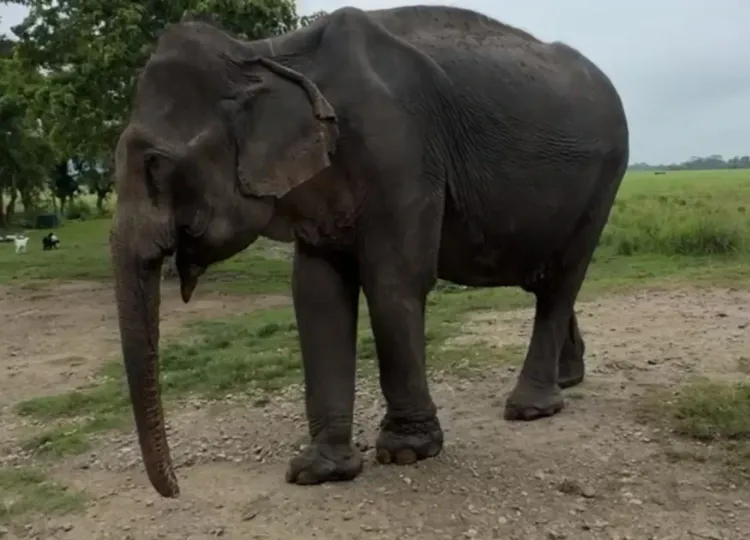Did 'Mohanmala', the Oldest Matriarch of Kaziranga National Park, Pass Away?

Synopsis
Key Takeaways
- Mohanmala's legacy will always be remembered in Kaziranga's history.
- She demonstrated exceptional loyalty and bravery throughout her life.
- Her contributions were vital to anti-poaching efforts in the park.
- The bond between humans and elephants can lead to remarkable stories of survival.
- Kaziranga National Park is crucial for wildlife conservation in India.
Guwahati, Aug 14 (NationPress) The Kaziranga National Park and Tiger Reserve in Assam was engulfed in sorrow as it bid farewell to its esteemed matriarch, Mohanmala, who departed this world on Thursday.
At an impressive age of approximately 70 to 80 years, Mohanmala held the title of the oldest elephant and the last matriarch within the park's boundaries, as per the officials.
Director of KNPTR, Sonali Ghosh, stated that a heartfelt ‘Shraddhanjali' sabha was conducted at Mihimukh in the park's central range, where officials performed the final rites.
Expressing their profound grief, the KNPTR authorities remembered Mohanmala as a cherished and iconic member of the department, particularly from the Kohora Range.
As revealed by the KNPTR Director, Mohanmala was brought to Kaziranga on May 17, 1970, after being acquired from Kamrup during the leadership of the then Principal Chief Conservator of Forests (PCCF), Durga Prasad Neog. Throughout her remarkable fifty-year service, she became an integral part of Kaziranga’s conservation legacy.
Mohanmala was celebrated for her fearlessness, obedience, and gentle nature, proving to be an excellent swimmer and a reliable companion during the challenging flood seasons. In times when even the frontline forest staff struggled to reach their camps by boat or carry out their patrols, it was Mohanmala who carried them on her back, ensuring that critical operations continued without interruption.
She played a crucial role across various ranges of Kaziranga, actively participating in anti-poaching missions and fearlessly assisting staff in the most daunting terrains.
Throughout her life, she gave birth to two female calves — 'Malati', who tragically died at just 17 years of age, and another calf that was lost to a tiger just three days after being born, as per the senior Indian Forest Service (IFS) officer.
Mohanmala took retirement from her official duties in 2003.
One remarkable story shared by her head mahout, Kiran Rabha, stands as a testament to Mohanmala’s courage and her instinctive protective nature.
“On a chilly winter morning, while patrolling near the wetland known as Mihibeel, I was mounted on Mohanmala, accompanied by her calf, Malati. Suddenly, a wild bull elephant charged towards us aggressively. In an incredible show of strength, it uprooted a large tree in its path. Sensing the imminent danger to us, Mohanmala swiftly turned towards the deep waters of Mihibeel, a place she was familiar with from previous flood seasons, and plunged in, encouraging Malati to follow,” recounted the KNPTR Director.
She expertly navigated the waters, ensuring Rabha was safe from the attacking bull, and only after reaching the opposite bank did she disappear into the forest with her calf. After weeks of absence, Mohanmala returned to the camp with Malati, calm and unharmed, serving as a poignant reminder of their enduring bond and resilience.
According to Ghosh, with the passing of Mohanmala, Kaziranga National Park has lost not just a dedicated worker but a loyal companion, a savior during floods, and a symbol of courage.
Her extensive service will forever be etched in the park’s history, and her absence will be profoundly felt by all who had the privilege of working alongside her, emphasized the KNPTR Director.
Kaziranga National Park, recognized as India’s seventh UNESCO World Heritage site, encompasses three forest divisions: the Eastern Assam Wildlife Division, Bokakhat; the Bishwanath Wildlife Division, Biswanath Chariali; and the Nagaon Wildlife Division, Nagaon.
Home to a remarkable population of the “Big Five,” it boasted 2,613 Greater One-horned Rhinoceroses as per the 2022 census, 104 Bengal Tigers (as of 2022), 1,228 Asian Elephants in 2024, 2,565 Wild Water Buffaloes in 2022, and 1,129 Eastern Swamp Deer also recorded in 2022.








